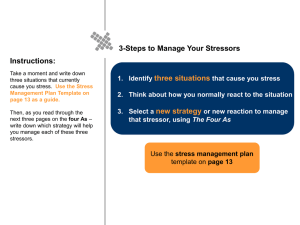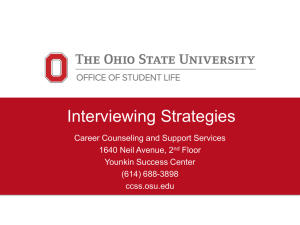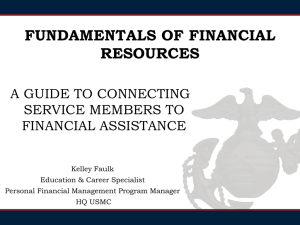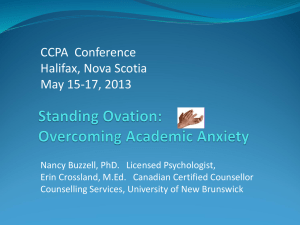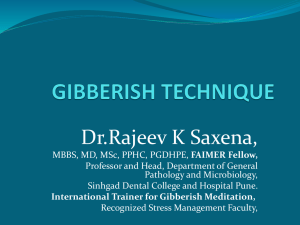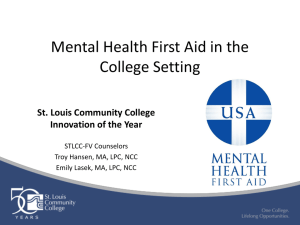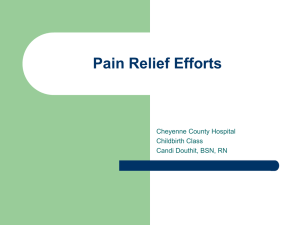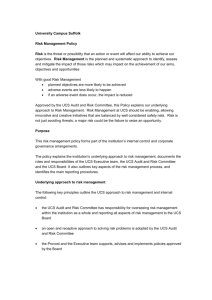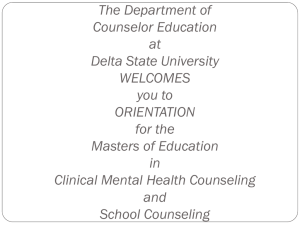Stress Management, Test Taking & Test Anxiety
advertisement
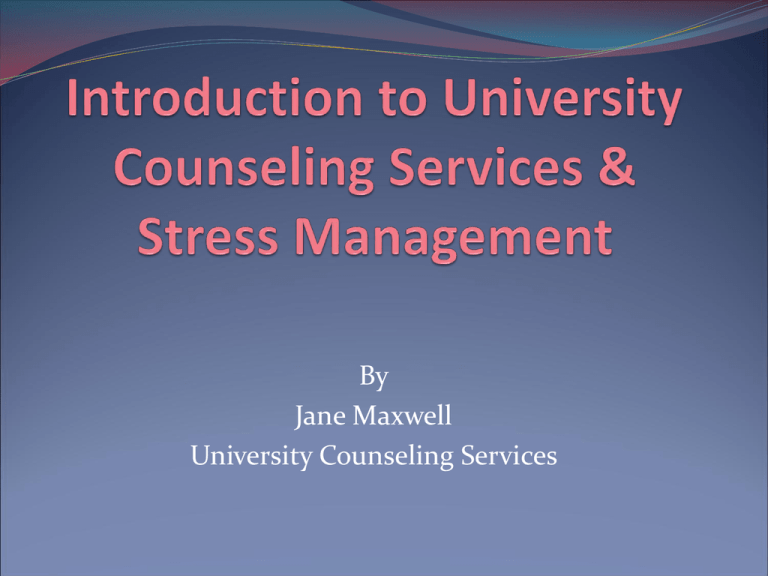
By Jane Maxwell University Counseling Services Counseling Services at Truman No cost for counseling services Services are confidential – It is your own personal business; only with written consent can another person know Hours are basically 8:00 to 5:00 week days (except for lunch) Located next to Grim Hall, across from Magruder Hall on Patterson Street; a little house What We Offer UCS offers: Individual Counseling Relationship or Couples Counseling Groups Consultations Presentations Educational Programming throughout the year Reasons Students Seek Counseling Truman students come for counseling to assist with many concerns Depression & Anxiety Homesickness Stress Related Issues Roommate Conflict Relationship Difficulties Suicidal Thoughts Eating Disorders Self-Harming Family Problems Academic Pressure Sexual Orientation Acceptance To Make an Appointment Call UCS @ 785-4014 or stop by For Information on our services and staff look at our website at ucs@truman.edu Also can friend UCS on Facebook First appointment is a screening 30 minute talk with a counselor to discuss your concerns and reasons for seeking counseling – not too in depth Then set up for an hour appt with a counselor, or with a group, or referred to other services Our Staff and Approach There are 5 licensed professionals Clients are seen for a short length of time (4 – 6 sessions) or maybe a longer time (9 – 10 sessions) The staff is friendly, understanding, and there for the students Individual appointments are usually every 10 days to 2 weeks Crisis situations always take priority Have an after hours crisis number for students if needed 665-5621 after 5:00 pm and weekends Stress- Why Is It Important to Talk About? Stress is the “wear & tear” on our body as we adjust to a continually changing environment It is the fight or flight response Present when there is an element of performance or expectation – OR a threat! Can Be either: Positive and protective Negative and destructive Positive & Negative Stress Positively stress can: Motivate us to be aware, better prepared, and open to new challenges and experiences Negatively stress can: Lead to constant worry, health problems, anger & discouragement, and a decrease in performance Stress for College Students Sources of Stress Personal & Family High Expectations Academic and Social Demands Relationships – Romantic or Friends Family Problems at Home Greek Fraternity & Sorority Pressures Lack of Sleep One of THE biggest problems with college life is a lack of sleep due to STRESS New study suggests stress about school keep 68% awake at night… 20% of them at once a week Affects of Stress Symptoms of stress appear in many ways. Everyone is different how they feel their stress – here are the different ways: PHYSICAL –muscle tension, low immune system, colds, flu, digestive problems, problems sleeping, headaches, low energy EMOTIONAL – depression, anger, fear or anxiety, feeling overwhelmed, moods swings, irritability, embarrassment More Affects COGNITIVE – difficulty concentrating, forgetfulness, critical self-criticism, unwanted or repetitive thoughts, mental disorganization BEHAVIORS – impulsive actions, crying, over eating or not eating, snapping at friends, isolation, nervousness, increase of alcohol or other numbing substances, total lack of ability to function as needed Identify Sources of Stress Consider 3 factors that contribute to Stress Situations Body Mind Stress Effects Stress is Powerful It creates big effects What contributes to Your Stress? Source SITUATIONS – What situations cause stress for you? Taking exams Giving a speech Being in a large group Roommate problems – dorm life Writing papers Everybody is different and has different triggers Source BODY – What changes happen to your body when stress hits? Chronic stress can cause headaches, muscle tension Stomach aches Migraines Insomnia Tight chest, feelings of panic Learn to know how you experience stress Source MIND – The mental message you tell yourself are POWERFUL Negative Messages – If I don’t get an A, I am a failure I always have to be and appear perfect If I don’t do well, my family will be so disappointed in me Positive Messages – I’m studying hard and doing the best I can I will do well because I know I tried I am a worthy person whether I get perfect grades or not Your Stress Keeping a stress journal or just being more aware can help – Ask yourself… What caused the stress? How did I feel both physically and emotionally? How did I react and respond? How did I help myself to feel better? As you are more aware you will begin to see patterns & common themes Unhealthy Coping These are unhealthy ways to cope with Stress: Drinking or eating too much Zoning out with TV or video games Lashing out at others – blaming others for everything Withdrawing from people & skipping class Procrastination Avoiding facing real problems Managing Stress Change the Situation or Change Your Reaction Change the Situation: Avoid the Stressor Alter the Stressor Change Your Reaction: Adapt to the Stressor Accept the Stressor Stress Management Strategies Here are 6 ways to Manage your Stress Strategy # 1. Avoid Unnecessary Stress Learn to say “no” Avoid people who stress you out Take control of your environment Avoid hot-button topics Cut down your to-do list More Strategies Strategy # 2. Alter the Situation Express your feelings instead of bottling them up Be willing to compromise Be more assertive Manage your time better Strategy # 3. Adapt to the Stressor Reframe your problems Look at the big picture Adjust your standards Focus on the positive Strategies Strategy # 4. Accept the things you cannot change Don’t try to control the uncontrollable Look for the upside Share your feelings Learn to forgive & give others some slack Strategy # 5. Make time for fun and relaxation Set aside relaxation time Connect with others Do something you enjoy everyday Keep your sense of humor Last Strategy Strategy # 6. Adapt a healthy lifestyle & habits Exercise regularly Eat a healthy diet as often as possible Reduce the caffeine & sugar Avoid excesses – alcohol, caffeine, cigarettes, etc. Get enough sleep to function day to day Seek help from a friend or counseling if needed Learn to Relax Find ways to help yourself relax Many people go non stop and don’t know how to relax Realize the negative self-talk and interrupt this process telling yourself positive messages Talk it out with someone – a friend, SA, trusted mentor, or professor Just being heard and understood can help Step back and get perspective – In the scheme of things is this worry & stress worth it? Suggestions to Cope Deal with one thing at a time and try not to be a perfectionist Work out at the Rec., go for a walk, run, yoga – find exercise you enjoy Listen to your favorite music Take time to laugh, watch a comedy, great comedian? Take a shower or bath Write your thoughts in a journal Other Ideas? What helps you when you are stressed? Learn The Relaxation Response 1. 2. 3. 4. 5. 6. Sit quietly in a comfortable position. Close your eyes. Deeply relax all muscles, beginning at your feet and progressing up to your face. Keep all muscles relaxed. Breathe through your nose. Become aware of your breathing. As you breathe out, say the word, "one" silently to yourself. For example, breathe in...out, "one," in...out, "one," etc. Breathe easily and naturally. You might also say the words "calm" or "let go" as you exhale. Continue for 5 to 10 minutes. As you feel yourself relax, you could try to visualize your favorite place -- a beach, lake, mountain stream, etc. Try to picture it in detail and recall feelings of peace and contentment while being there. Do not worry about whether you are successful in achieving a deep level of relaxation. Maintain a passive attitude and permit relaxation to occur at its own pace. When distracting thoughts occur, try to ignore them by not dwelling upon them. Relaxation Time Management Good Time Management is associated with college success & satisfaction It can reduce the anxiety levels and make college more enjoyable Consider These Steps: Plan Prioritize Schedule Planning Planning can increase your effectiveness and decreases your stress Start by looking at the entire semester and what to plan for with assignments, social demands, etc. Then scale it down to each week or smaller chunks of the semester (beginning, mid-terms, end & finals) Develop a plan for the semester, then for each week Prioritize Take a look at all your assignments, deadlines and demands Make decisions on what is a priority – This is a constant ongoing process of looking at what is coming next and how does it rate in importance Include time for the life stuff: meetings, laundry, job, errands, meals Be realistic with yourself and allow enough time Schedule Identify how you will approach and accomplish all these tasks Think about how much time you will need and how many hours needed to study Break some of the assignments down into smaller jobs – for example researching, writing, & editing a paper Adjust and monitor constantly Time Wasters Identity where, how, & when you are wasting time E-Mail Internet Games, Video Games Facebook Phone Calls Problems with Procrastination When do you work the best? Morning, night? When is the best time for you to plan to study? Keep Yourself Accountable Try to keep on your time management schedule Don’t beat yourself up if you get off track Jump back into your plan and routine Allow yourself to be human which means you will make mistakes occasionally Check out the Truman Success Center in the Kirk Bldg. for academic setbacks and difficulties Call UCS for assistance if you become overwhelmed



